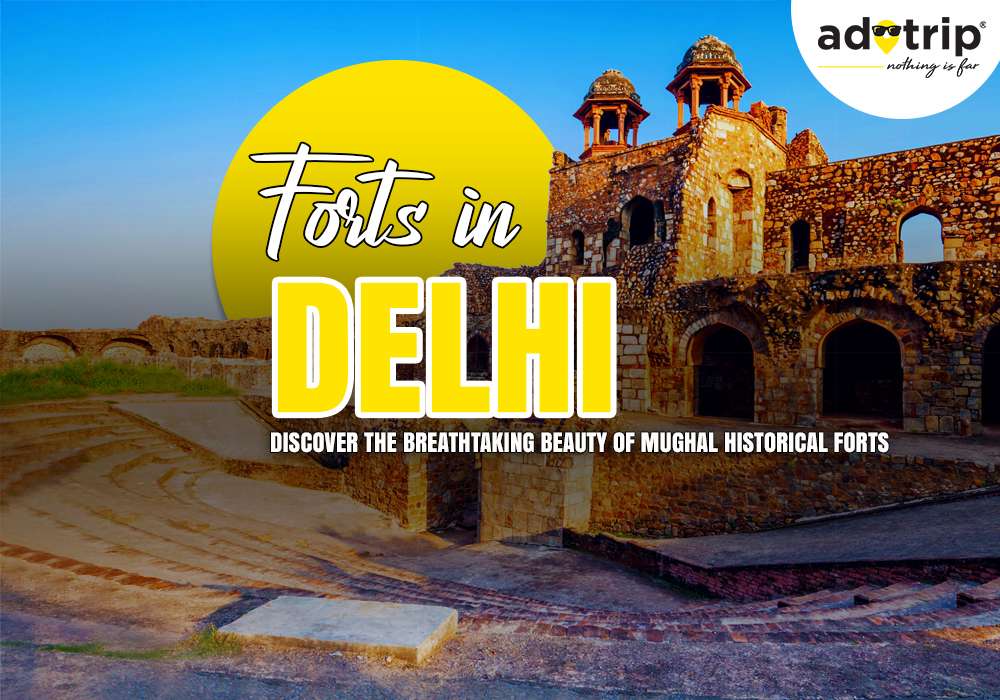
Last Updated At: 31-May-2024
7 Famous Forts In Delhi You Must Visit
It will be a memorable vacation as you visit Delhi, the capital city of India, to view the rich heritage and architectural wonders. Delhi is one of the most important historical cities in the Indian subcontinent, peppered with architecturally brilliant Mughal forts in Delhi dating back to ancient dynasties.
As you are eager to explore, you come across some beautiful masterpieces from the ancient period. From the towering red sandstone ramparts of the magnificent Red Fort to the princely glory of the lesser-known Tughlaqabad Fort, each citadel tells its tale. As we walk through the mysteries and legends that envelop these ancient forts in Delhi, we try to describe the beautiful architectural arena and its importance in making the history of Delhi.
Buckle in your seat belts, history buffs and lovers of some adventurism, as this time we head through a journey full of thrill, scouring the length and breadth of historical forts in Delhi, taking turns back to the glorious past of India.
Top 7 Delhi Forts List
Here presenting a curated list of the most renowned forts in Delhi, where history comes alive:
Qila Rai Pithora - The Oldest Fort
- Red Fort - Stunning Red Sandstone Architecture
- Tughlaqabad Fort - Capital of the Tughlaq Dynasty
- Salimgarh Fort - Association with the Mughal Empire
- Siri Fort - Second Medieval City of Delhi
- Feroz Shah Kotla Fort - Looks Stunning with Polished Sandstone
- Zafar Mahal - Beautiful Indo-Islamic Architecture
Read More : Reasons To Visit Delhi
1. Qila Rai Pithora | The Oldest Fort
Rai Pithora Fort is another name that Qila Rai Pithora is known for being the first genuine solid structure that has survived in the capital. Its historical importance can be traced back to AD 1160, during which the Chauhan rulers took over the rulers of Tomars. The Chauhans captured Lal Kot, which is said to be the oldest urban area in the area. Later, Prithviraj Chauhan, the great Rajput king, expanded the 8th-century walls of Lal Kot and renamed it Qila Rai Pithora. Even the ruins of the Durbar Hall are visible in different places like Saket, the Qutub Complex, Vasant Kunj, and Kishangarh.
- Major Highlights. Engage in an exhilarating zip-lining adventure, soaring through the air and experiencing the thrill of the majestic surroundings.
- Timings. 9 AM to 5 PM
- Entry Fee. Indians-INR 60 | Foreigners- INR 400
Read More : Places To Visit In Delhi
2. Red Fort | Stunning Red Sandstone Architecture
For nearly two centuries, the grand Red Fort in Delhi remained the magnificent residence of the mighty Mughal emperors before it fell into the hands of the British in the year 1857. In any case, besides being a reminder of the opulence of the Mughal era, the Red Fort has been a mute witness to those historical events that significantly impacted the formation of modern India. Its importance is such that in 2007, UNESCO awarded it the proud status of a World Heritage Site, recognising its historical and cultural significance. The Red Fort is one of the most prominent Mughal Forts in Delhi. When you visit this fort, you are instantly transported down memory lane to the pages of history, experiencing the height of opulence and architectural brilliance that marked the Mughal reign.
- Major Highlights. Indulge in the admiration of the stunning architecture, marvelling at the intricate details and timeless beauty that adorn every corner.
- Timings. 9 AM to 5 PM
- Entry Fee. Indians- INR 60 | Foreigners-INR 400
Read More : Places To Go Shopping In Delhi
3. Tughlaqabad Fort | Capital of the Tughlaq Dynasty
Commonly known as Ruined Fort, Tughlaqabad Fort stands as a specimen of strength the Tughlaqs beheld. This fort is a fine example of grandeur in pure Islamic architectural style and is decorated with a touch of the Sultan's finesse. Every detail in the towering walls, transparent domes, and heavy carvings of the fort is a masterpiece of craftsmanship. But for all its grandeur, the Tughlaqabad Fort, shortly after its completion, had to face the unfortunate fate of abandonment. Plenty of stories are circulating about why it was deserted; curses and hauntings of the place immediately come to mind.
- Major Highlights. Experience the captivating surroundings, where the beauty of the premises harmoniously blends with modern settlements, all while being accompanied by the majestic presence of the royal tomb.
- Timings. 7 AM to 5 PM
- Entry Fee. Indians-INR 5 | Foreigners-INR 100
Read More : Offbeat Places From Delhi
4. Salimgarh Fort - Association with the Mughal Empire
Built in 1546 by Islam Shah Suri, successor to Sher Shah Suri, this fort was constructed when the Yamuna River still had islands dotted across its expanse. In 1622, Jehangir connected it with the Red Fort through an island, only to see the British later lay a railway line. The fort ultimately was transformed into a prison for Indian revolutionaries, and it underwent a transformed trajectory over the course of time. Presently, it is a recognised UNESCO-protected Swatantara Senani Smarak. Among all forts, this piece of architectural wonder is listed as one of the finest forts near Delhi, with a gorgeous triangular shape. Its influences are the Mughal, Timurid, and Persian styles.
- Major Highlights. Engage in an exhilarating zip-lining adventure, soaring through the air and experiencing the thrill of the majestic surroundings.
- Timings. Closed on Monday but can be visited any time before sunset on other days.
- Entry Fee. Indians-INR 60 | Foreigners-INR 400
Read More : Tourist Places Near Delhi
5. Siri Fort | Second Medieval City of Delhi
According to legends passed down through generations, Alauddin Khilji, the ruler of the time, ordered the burial of the heads of 8000 Mongol soldiers within the foundations of this fort. It is from this act that the fort derived its name - Siri. The term "Siri" originates from the word "sir," meaning "head" in English. Siri Fort once stood as a fortified city, serving as the central power hub for the Khilji dynasty.
Within the premises of Siri Fort, one can find the remnants of the Palace of a Thousand Pillars, a testament to the grandeur and opulence of the time. The fort was also known for its seven gates, each opening towards different parts of the city.
- Major Highlights. The serene ambience of the fort's gardens provides a peaceful retreat from the bustling city.
- Timings. 9 AM to 5 PM
- Entry Fee. Free entry
Read More : Weekend Getaways From Delhi
6. Feroz Shah Kotla Fort - Looks Stunning with Polished Sandstone
This fort had been constructed by Feroz Shah Tughlaq during the mid-14th century on the banks of the Yamuna. One of the significant attractions the sultan added was the famous Topra Ashokan Pillar, a massive structure weighing 23 tons and dating back to the 3rd BC century. There probably was a prayer hall in the mosque with its large courtyard that now lay in ruins, but it speaks volumes of piety. Meanwhile, the round ball, located northwest of the Ashokan Pillar, is in a dilapidated state and, at present, also locked by the authorities.
- Major Highlights. The tranquil surroundings of the fort's gardens provide a serene retreat in the heart of the city.
- Timings. Closed on Monday but can be visited from 6 AM to 6 PM on other days.
- Entry Fee. Indians-INR 15 | Foreigners-INR 100
Read More : Culture Of Delhi
7. Zafar Mahal | Beautiful Indo-Islamic Architecture
This fort stands as a symbol of the effulgent Mughal era and old-world charm and blossom into one of the most beautiful forts in Delhi. On this day, the Zafar Mahal stands in a withered condition, representing the fragments of its past. Red sandstone and marble pillars, grand arched windows—all connected with many examples of filigreed ceilings—porticoes known popularly as chajjas take the breath away from the visitors to this place. On this very terrace, one finds the tomb of Alauddin and, simultaneously, the pearly Moti Masjid, both lending calmness to the vicinity.
- Major Highlights. Step back in time and appreciate the grandeur and significance of the Mughal dynasty.
- Timings. 9 AM to 5 PM
- Entry Fee. Free entry
Read more : Foods Of Delhi
Unravel a diverse historical canvas that ranges from magnificent forts in Delhi to an entire spectrum of tombs, temples, and monuments of great historical significance. Make an extended trip to Delhi because you have so much to unravel and explore in this vibrant tapestry of heritage. Plan your trip so you get enough time to visit the historical forts in Delhi. Let the magnetic stories of Delhi's age-old forts speak to your senses. Plan your trip with Adotrip, your go-to travel solutions provider. From flight deals to hotel reservations and tour packages to 24x7 travel assistance, we curate the best of vacations!
With us, nothing is far!
Book Delhi Tour Packages
Frequently Asked Questions on Famous Forts in Delhi
Q. What are some famous forts in Delhi?
A. Delhi has a rich historical past with several famous architectural and cultural heritage forts. Among the famous forts in Delhi are the Red Fort, Qila Rai Pithora, Tughlaqabad Fort, Salimgarh Fort, and others.
Q. How many forts are there in Delhi?
A. Although Delhi boasts more than a dozen forts in and around the city, some of them are must-visit options. Here are some of them.
Q. Qila Rai Pithora - The Oldest Fort
A. Red Fort - Stunning Red Sandstone Architecture
Q. Tughlaqabad Fort - Capital of the Tughlaq Dynasty
A. Salimgarh Fort - Association with the Mughal Empire
Q. Siri Fort - Second Medieval City of Delhi
A. Feroz Shah Kotla Fort - Looks Stunning with Polished Sandstone
Q. Which is the oldest fort in Delhi?
A. The oldest fort in Delhi is the Purana Qila, located in the Mehrauli area.
Q. Which is the most famous fort in Delhi?
A. Red Fort near Chandni Chowk neighbourhood is one of Delhi's most famous and visited forts.
Q. How can I reach the Red Fort, Delhi, India?
A. The Red Fort, or Lal Qila, is located in the old part of Delhi, particularly the Chandni Chowk neighbourhood. Here are a few easy ways to reach the fort.
- Metro Station.Chandni Chowk Metro Station
- DTC Bus No - 539
Q. What is the historical importance of the Tughlaqabad Fort in Delhi?
A. The fort of Tughlaqabad in Delhi has great historical importance. It was constructed by Ghiyas-ud-din Tughlaq, the founder of the Tughlaq dynasty. It was the capital of this dynasty and showcases the unique architectural style of that period.
Q. Is there any architectural marvel or uniqueness in the splendid forts of Delhi?
A. The forts in Delhi, including the Red Fort, symbolise architectural marvels and uniqueness. They are a great mixture of architectural styles, with several features of Mughal, Indo-Islamic, and Rajput architectural styles. They have significant features of complex carvings, great gateways, majestic palaces, and massive fortifications.
Q. Can I enter inside the forts of Delhi?
A. Yes, the forts of Delhi are open to tourists, but entry to a few areas within the forts is restricted because of conservation or incompletely restored reasons. Tourists can generally look at the main structures, palaces, museums, and other designated areas within the forts.
Q. Can we look for some accommodation places near the forts of Delhi?
A. Several accommodations are available in and around the forts in Delhi. Several hotels and guest houses also offer budget accommodations in the city, depending on preferences and budgets.
Q. Can you suggest any particular way I can keep myself safe during my visit to the forts in Delhi?
A. It is always good to take some precautions while visiting the historical forts in Delhi. Always keep your belongings safe and secure, follow all instructions or guidelines set by authorities, and keep yourself hydrated while moving around the forts. Dress comfortably and wear sensible footwear for exploring the castle grounds.
--- Published By Arpita Mathur
Latest Blogs

17 Best Places for 2 Days Trip from Delhi

Top 10 Hill Stations Near Bangalore for an Unforgettable Get...

Top 10 Hill Stations Near Chennai For a Perfect Getaway

10 Best Hill Station Getaways Near Gurgaon for Peace Seekers

10 Astonishing Underwater Temples of India You Must Visit in...
Popular Packages
Popular Flights
Goa to Vishakhapatnam Flights
Hyderabad to Kolkata Flights
Kolkata to Jaipur Flights
Pune to Bangalore Flights
Varanasi to Hyderabad Flights
Kochi to Kochi Flights
Srinagar to Mumbai Flights
Nagpur to Mumbai Flights
Amritsar to Kochi Flights
Bangalore to Srinagar Flights






 Dubai
Dubai Malaysia
Malaysia USA
USA






